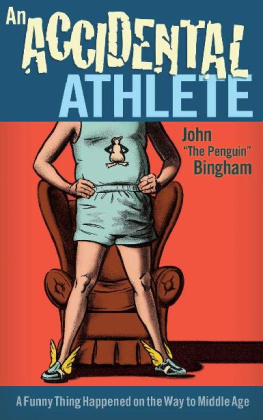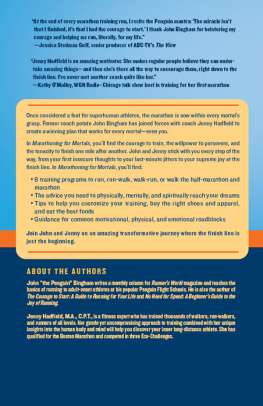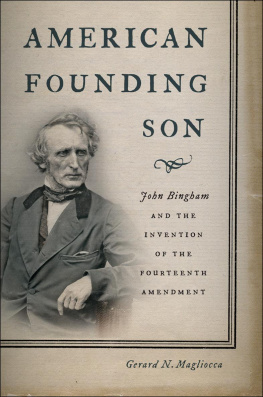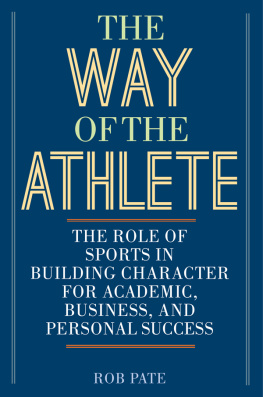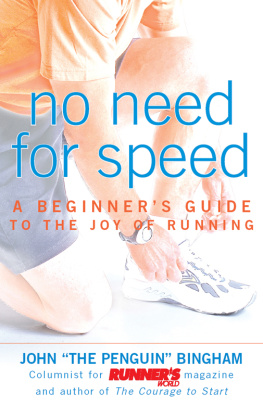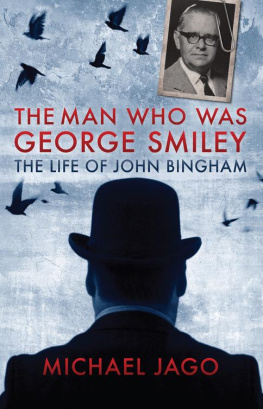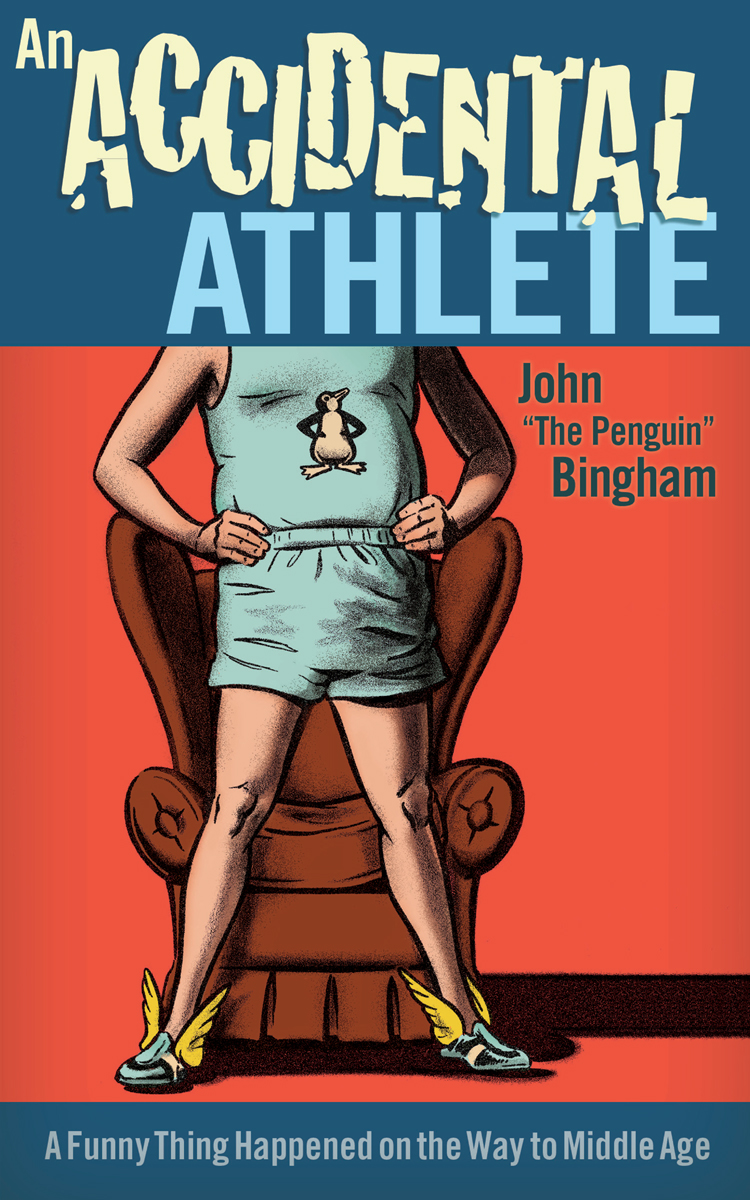PRAISE FOR JOHN THE PENGUIN BINGHAM AND AN ACCIDENTAL ATHLETE
John The Penguin Bingham has touched a nerve with runners worldwide like no one in the last decade. Hes funny but serious, informal but inspirational, and his spoken and written words have become the rallying cry for tens of thousands of runners who have found a patron saint where they least expected onein the back of the pack. With The Penguin as their leader, they have found not just the courage to start, but also the determination to finish.
Amby Burfoot, Runners World magazine
John The Penguin Bingham does it again! An Accidental Athlete is a charming, witty, and relatable tale of John finding himself through running. In this great book he shares his journey with us one stride and two laughs at a time.
Deena Kastor, American marathon record holder,
Olympic medalist, and 12-time national champion
Most of us can truly identify with John Binghams story: There are no gold medals, no laurel wreaths, no world records. But John shows us that we have something more important: a chance, if we have the will and believe in ourselves. Because of runners like John, the wall of intimidation has crumbled, and tens of thousands of Americans are now believing in themselves. John has helped raise self-esteem and self-confidence in people all over the world. Nothing is more important to a persons well-being.
Dave McGillivray, Boston Marathon race director
John Bingham is Edward Abbey, Frank Shorter, Brad Pitt and George Carlin all wrapped in one. John as writer has a lesson or tale in all his adventures. I learn so much about myself reading The Penguin Chronicles. As a speaker he is funny, sincere and lovable.
Bart Yasso, Runners World magazine
An Accidental Athlete is a great read and an affirmation of why we run. The next time you find yourself in doubt, bring The Penguin with you and youll be glad you did.
Kathrine Switzer, first woman to officially run the Boston Marathon,
New York City Marathon winner, and author of Marathon Woman
An Accidental Athlete is a book for everyone. Current exercisers will smile, as the mistakes John made are ones we have all made. Nonexercisers will see thatlike Oprahanyone can become an adult-onset athlete. Get on the Penguin bus because it is leaving the station!
Running Doc , Lewis G. Maharam, MD,
author of Running Docs Guide to Healthy Running
When John steps in front of an audience, the quiet-spoken college prof disappears, and he becomes The Penguin. Behind his humor lies an invitation to everyone, of any size and speed, to fit as comfortably into this sport as he did at his start.
Joe Henderson, former editor of Runners World magazine
John Bingham is the voice of the millions of those who are beginning to exercise each year. John feels their concerns and, with humor, provides the motivation to keep going.
Jeff Galloway, running coach and author of Marathon: You Can Do It!
John Bingham brings a bit of irreverence and a big dose of humor to his talks about running and races. He gets you to laugh, and we need that before races!
Bill Rodgers, 4-time winner of the
Boston Marathon and New York City Marathon


Copyright 2011 by John The Penguin Bingham
All rights reserved. Published in the United States of America by VeloPress, a division of Competitor Group, Inc.

3002 Sterling Circle, Suite 100
Boulder, Colorado 80301 USA
(303) 440-0601 Fax (303) 444-6788
E-mail velopress@competitorgroup.com
Distributed in the United States and Canada by Ingram Publisher Services
Library of Congress Cataloging-in-Publication Data
Bingham, John, 1948
An accidental athlete: a funny thing happened on the way to middle age /
John The Penguin Bingham.
p. cm.
ISBN 978-1-937716-00-4 (ebook)
1. Bingham, John, 1948 2. Runners (Sports)United StatesBiography.
3. RunningAnecdotes. I. Title.
GV1061.15.B56A3 2011
796.42092dc22
[B]
2011012211
For information on purchasing VeloPress books,
please call (800) 811-4210 ext. 2169 or visit www.velopress.com.
Cover design by Jason Farrell
Cover illustration by Jonathan Carlson
Interior design by Vicki Hopewell
v 3.0
CONTENTS
INTRODUCTION
I cant remember when I stopped wanting to play. As a young child all I thought about was playing. I played with toy trucks. I played baseball with my friends; I played basketball with my neighbors. I never worried about what I was playing, or even with whom I was playing. I especially didnt worry about how well I was playing.
At some point, though, I discovered that I wasnt very good at the very activities that brought me the most joy. This was a heartbreaking moment, and the discovery sentenced me to a long period of sedentary confinement.
What characterizes the act of play, it seems to me, is that it isnt defined by arbitrary performance standards. When I watch children play, when I remember what it was like for me to play as a child, I see only the joy in the activity itself, not the awful prospect of failure or even the promise of success. Its just play.
Its difficult for us as adults to give ourselves permission to enjoy something that we dont think were very good at. We tell ourselves that once weve reached some level of proficiency, once weve acquired some minimum set of skills, thenand only thenwill the activity begin to be fun.
At least thats the way it was for me.
I wanted to play tennis, but when after a few weeks I noticed that I wasnt getting much better at it, I quit. Even though I was having fun chasing balls around the court, I quit because I didnt think I was good enough to have fun.
For me, this dreadful thought that I had to be knowledgeable or skillful about something before I could enjoy it didnt stop with athletics. I used to enjoy drinking a glass of wine from time to time until I was told how much there is to know about wine before you can decide whether you like it or not.
I had tried to become a runner at a couple of earlier points in my life, and each time I failed because I ignored the most important aspect of my running experience: the pure fun of it.
I had the idea in my head that running needed to be, if not torturous, at least physically exhausting. For it to be good for me, for running to do me any good, for me to truly experience life as a runner, I had to be at the edge of fatigue and pain at all times.
This approach didnt work well for me.
No sane person is going to do something that repeatedly hurts him or her. People are not going to continue to hit themselves on the head with a hammer once it occurs to them that it hurts and that if they stop hitting themselves, the pain will go away.
Too often new runnersand walkerstake the attitude that they must continue to hit themselves in the head, that they must continue to accept that the activity theyve taken up to make themselves feel better must first make them feel worse.


